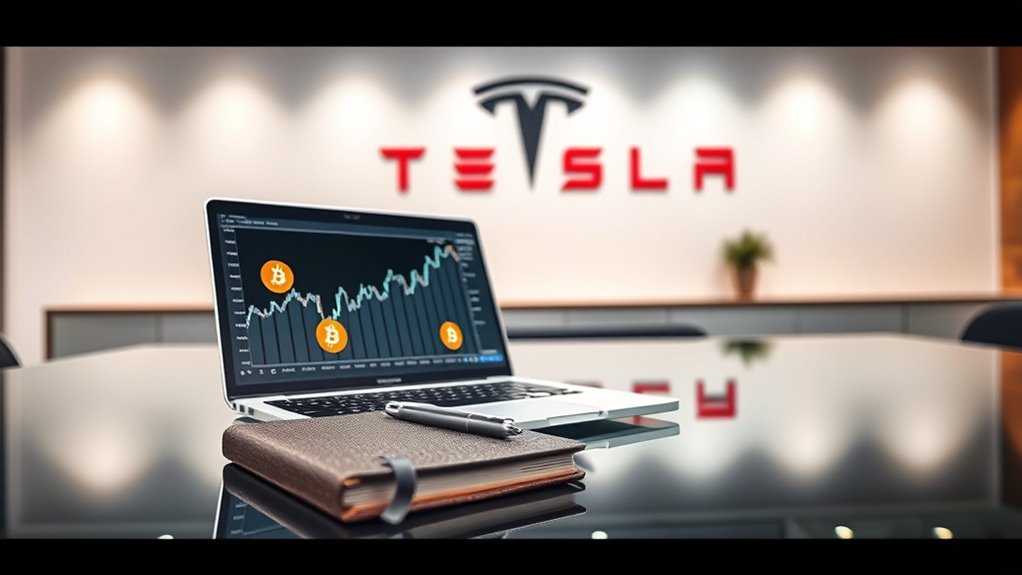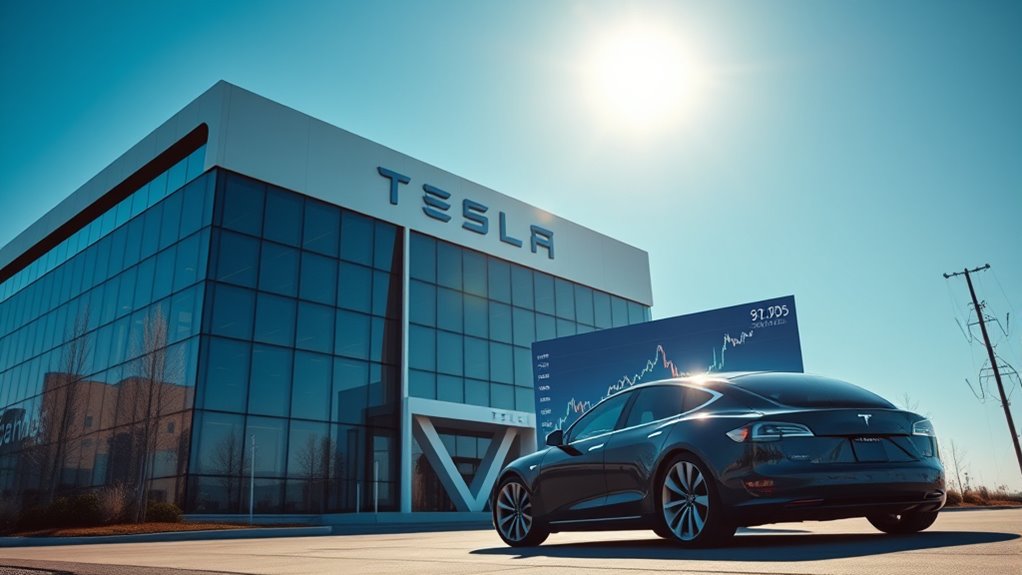Tesla recently disclosed in an SEC filing that it holds around $500 million worth of Bitcoin, after investing $1.5 billion in early 2021. This move aims to diversify its assets and enhance confidence in cryptocurrencies. The holdings impact Tesla’s financial statements, with gains or losses reflected based on Bitcoin’s market value. If you explore further, you’ll see how Tesla’s crypto strategy influences its market position and future plans.
Key Takeaways
- Tesla disclosed approximately $500 million worth of Bitcoin holdings in its SEC filings.
- The holdings represent about 11,509 BTC, initially purchased in February 2021.
- The Bitcoin is classified as a digital asset and impacts Tesla’s financial statements.
- Disclosure was made via SEC filings, such as Form 8-K, ensuring transparency.
- Tesla’s Bitcoin investment strategy aims to diversify assets and demonstrate confidence in cryptocurrencies.
Tesla’s Initial Bitcoin Investment and Strategic Rationale

Tesla made its first significant Bitcoin purchase on February 8, 2021, investing $1.5 billion as part of its broader financial strategy. You recognize that this move aimed to diversify Tesla’s assets and hedge against potential fiat currency depreciation. By holding Bitcoin, Tesla sought to tap into the growing digital asset market and demonstrate confidence in cryptocurrencies. This strategic shift aligned with Tesla’s innovative and forward-thinking brand image, signaling to investors that the company was exploring new ways to strengthen its financial position. The investment also reflected a belief in Bitcoin’s long-term value and potential as an alternative store of value. Overall, Tesla’s initial purchase marked a deliberate step toward integrating digital assets into its corporate treasury.
Details of Tesla’s Bitcoin Holdings and Valuation

Tesla holds approximately 11,509 BTC on its balance sheet, valued at over $500 million based on recent market prices. This figure reflects the current valuation of Tesla’s digital asset investment, calculated from the number of coins held and prevailing Bitcoin prices. The company’s holdings have remained relatively stable, with no significant changes reported up to Q2 2025. In Tesla’s SEC filings, Bitcoin is classified as a digital asset and valued based on fair value inputs, impacting financial reports and earnings. The valuation fluctuates with Bitcoin’s market volatility, which can influence Tesla’s reported net income and balance sheet strength. This strategic asset diversification demonstrates Tesla’s commitment to integrating innovative financial tools within its corporate portfolio. Additionally, the water resistance features of certain high-end running gear highlight the importance of durable equipment in extreme weather conditions, similar to how Tesla ensures the resilience of its digital assets against market fluctuations.
Impact of Bitcoin on Tesla’s Financial Statements

The valuation of Bitcoin holdings directly influences Tesla’s financial statements, particularly its income statement and balance sheet. Your investment’s market value fluctuation impacts reported earnings and asset balances. Here are four key effects:
- Earnings Volatility: Bitcoin’s price swings cause gains or losses that appear on Tesla’s income statement, affecting quarterly profits.
- Asset Valuation: The Bitcoin holdings are recorded as digital assets, influencing Tesla’s total assets and equity on the balance sheet.
- Fair Value Adjustments: Tesla reports changes in Bitcoin’s fair value, which can lead to significant balance sheet revaluations.
- Transparency and Disclosure: Tesla must disclose how Bitcoin impacts its financial health, shaping investor perception and confidence.
This dynamic makes Tesla’s financial results more sensitive to cryptocurrency market movements.
Regulatory Disclosures and SEC Filings Regarding Digital Assets

You should understand that Tesla’s SEC filings require clear disclosures about its digital assets, including Bitcoin. These filings categorize Bitcoin as a Level 1 or Level 2 fair value asset, which affects how it’s valued and reported. Staying aware of these regulatory requirements helps you grasp how Tesla’s crypto holdings are transparently integrated into its financial statements. Additionally, the increasing use of AI in financial disclosures signals a future where automated systems may enhance transparency and accuracy in reporting.
SEC Filing Requirements
Regulatory disclosures related to digital assets like Bitcoin require companies to comply with specific SEC filing rules that guarantee transparency and accountability. These rules ensure investors understand how companies hold and value their crypto assets. To meet SEC standards, you should be aware of:
- Filing deadlines for quarterly (Form 10-Q) and annual (Form 10-K) reports, including crypto holdings disclosures.
- Classifying digital assets accurately, often as Level 1 or Level 2 fair value inputs, to reflect their valuation methods.
- Disclosing material changes in holdings or valuation, especially significant market fluctuations affecting asset value.
- Furnishing, not filing, certain disclosures like Bitcoin holdings on Form 8-K, which are made available to the public but don’t become part of formal SEC filings unless referenced.
- Understanding how Honda Tuning concepts like ECU tuning and suspension upgrades relate to transparency in performance modifications, which can be analogous to properly disclosing and classifying digital asset holdings.
Staying compliant guarantees your company maintains transparency and investor confidence.
Asset Classification and Valuation
Asset classification and valuation are critical components of regulatory disclosures for digital assets like Bitcoin, ensuring investors understand how companies record and assess these holdings. You’ll see that Tesla classifies Bitcoin as a digital asset on its SEC filings, specifically under Forms 10-Q and 10-K. The company often reports Bitcoin as a Level 1 or Level 2 Fair Value Input asset, which reflects its approach to valuation based on market prices and observable data. Tesla’s filings clearly distinguish Bitcoin from inventory or intangible assets, highlighting its role as an investment asset. Its valuation fluctuates with market prices, impacting quarterly earnings through fair value adjustments. This transparency helps you gauge how Tesla’s Bitcoin holdings influence the company’s financial health and provides insight into its risk management strategies. Additionally, understanding asset support solutions used in financial reporting can further clarify how digital assets are managed and valued.
Market Reaction and Investor Sentiment Toward Tesla’s Crypto Strategy

Your analysis shows that Tesla’s Bitcoin disclosure has sparked a positive reaction in the stock price, reflecting increased investor confidence in its crypto strategy. Institutional investors seem more assured of Tesla’s commitment to digital assets, boosting credibility across markets. This shift suggests that Tesla’s move could influence broader acceptance of cryptocurrencies in corporate treasury management. Additionally, understanding market dynamics can help investors anticipate future trends in digital asset adoption.
Stock Price Impact
Tesla’s recent disclosure of holding approximately $500 million worth of Bitcoin has sparked significant market reactions and shaped investor sentiment. This news has prompted a notable impact on Tesla’s stock price, influencing both confidence and speculation. Here are four ways it’s affecting the market:
- Investors see Tesla’s crypto move as a sign of innovative foresight, boosting confidence in the company’s growth potential.
- Short-term volatility increases as traders react to Bitcoin’s price swings and Tesla’s reported holdings.
- Institutional investors interpret the disclosure as a shift toward diversified treasury strategies, possibly supporting long-term stock stability.
- Market sentiment improves among crypto enthusiasts, viewing Tesla’s move as mainstream acceptance, which can positively influence TSLA shares.
- The integration of cryptocurrencies into corporate strategy highlights evolving investment assets and the increasing role of digital currencies in financial planning.
The overall impact reflects a mix of optimism and caution, shaping Tesla’s stock trajectory.
Institutional Confidence Rise
The recent disclosure of Tesla’s $500 million Bitcoin holdings has bolstered institutional confidence in the company’s innovative approach to treasury management. You’ll notice that major investors and industry analysts now view Tesla as a leader in integrating digital assets into corporate finance. This move signals a strong endorsement of cryptocurrency’s legitimacy as a strategic asset class, encouraging other institutions to *contemplate* similar strategies. Investor sentiment shifts toward increased trust in Tesla’s forward-thinking vision, reinforcing its reputation as an innovative market player. The transparency provided through SEC filings enhances credibility, reducing perceived risks associated with crypto investments. Additionally, the focus on asset allocation demonstrates Tesla’s strategic approach to balancing risk and reward in its investment portfolio. Overall, Tesla’s crypto strategy fosters greater confidence among institutional stakeholders, positioning the company as a trailblazer in mainstream crypto adoption.
Tesla’s Broader Corporate Profile and Innovation Focus

Tesla has established itself as a leader in innovation by integrating advanced technology across its product lines and business operations. Your focus should be on how Tesla pushes boundaries beyond electric vehicles. Here are four key aspects of its broader corporate profile:
- Pioneering energy storage solutions and renewable energy products.
- Developing autonomous driving technology to revolutionize transportation.
- Expanding global manufacturing and charging infrastructure for wider adoption.
- Investing in cutting-edge battery tech and sustainable materials.
These initiatives demonstrate Tesla’s commitment to innovation, shaping industries beyond cars. Elon Musk’s leadership drives a culture of disruption, integrating technology seamlessly into everyday life. Tesla’s corporate strategy emphasizes diversification and forward-thinking, cementing its role as a multi-faceted technology company. Additionally, Tesla’s focus on aura and energy management technologies underscores its commitment to sustainable and holistic solutions that extend beyond traditional automotive design.
Future Outlook for Tesla’s Cryptocurrency Portfolio

As Tesla continues to innovate across multiple sectors, its approach to digital assets like Bitcoin is likely to evolve in response to market developments and strategic priorities. You can expect Tesla to reassess its cryptocurrency holdings regularly, potentially increasing or diversifying its digital asset portfolio as market conditions and internal goals shift. Elon Musk’s public statements and Tesla’s financial disclosures suggest ongoing interest in blockchain technology and crypto innovation. The company might explore integrating crypto payments or expanding its digital assets to support its broader sustainability and technological ambitions. However, Tesla will also weigh risks such as Bitcoin’s volatility and regulatory changes, balancing its pioneering spirit with prudent risk management. Overall, Tesla’s crypto future remains adaptable, driven by innovation and strategic growth. Additionally, vibrational alignment with market trends and internal values will play a key role in guiding its investment decisions.
Frequently Asked Questions
Has Tesla Increased or Decreased Its Bitcoin Holdings Since the Initial Purchase?
You see that Tesla hasn’t substantially increased or decreased its Bitcoin holdings since the initial purchase. They bought around 11,509 BTC in early 2021, and public data shows no notable changes up to 2025 Q2. This steady position indicates Tesla is holding onto its Bitcoin as a strategic treasury asset, rather than actively trading or adjusting their holdings frequently. Their focus appears to be on maintaining their established digital asset strategy.
What Is Tesla’s Current Strategy for Managing Its Bitcoin Assets?
You manage your Bitcoin assets like Tesla, balancing innovation with caution. Currently, Tesla’s strategy involves holding its Bitcoin as a treasury diversification, treating it as a Level 1 or Level 2 fair value asset, and reporting gains or losses transparently. You focus on maintaining balance, using Bitcoin as a hedge against fiat currency depreciation, and monitoring market conditions closely to decide when to buy, hold, or potentially sell.
How Does Tesla Account for Bitcoin’s Volatility in Its Financial Reports?
You should know Tesla accounts for Bitcoin’s volatility by using fair value accounting, which reflects the current market price on its balance sheet. When Bitcoin’s value changes, Tesla records gains or losses in its income statement, affecting quarterly earnings. This approach guarantees your financial reports accurately show the asset’s fluctuating worth, providing transparency about how Bitcoin’s price swings influence Tesla’s overall financial health.
Are There Any Plans for Tesla to Buy More Bitcoin in the Future?
While there’s no official announcement, you might consider that Tesla’s future Bitcoin purchases depend on market conditions and strategic priorities. The company has historically used Bitcoin as a treasury diversification tool, balancing the potential for appreciation with volatility risks. Given Tesla’s innovative approach, it’s plausible they could buy more Bitcoin, especially if they see continued value or opportunities to strengthen their digital asset strategy, but nothing concrete has been confirmed yet.
How Does Tesla’s Bitcoin Holding Compare to Other Corporate Crypto Investments?
You’ll find Tesla’s Bitcoin holdings are significant but modest compared to some corporate investors. While Tesla holds around 11,509 BTC valued at over $500 million, companies like MicroStrategy own thousands of bitcoins worth billions. Tesla’s approach is more cautious, aligning with its broader diversification strategy. Compared to other firms, Tesla’s investment reflects a strategic, but not dominant, stake in crypto, emphasizing innovation without overexposure.
Conclusion
As you watch Tesla’s bold move ripple through the financial landscape, it’s like witnessing a modern-day gold rush in a digital frontier. Their Bitcoin holdings, now etched in SEC filings, signal a daring pursuit of innovation and resilience. Just as explorers once charted uncharted waters, Tesla’s embrace of crypto hints at a future where technology and finance intertwine seamlessly, inspiring you to contemplate what new horizons lie beyond the horizon of traditional investments.









